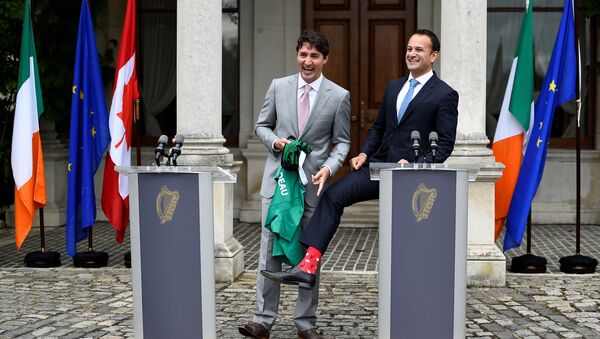The leader of the Liberal Party argued that Canada and Ireland should take advantage of their respective neighbor's increasingly isolated approach by seizing new openings on the global stage.
"There are tremendous opportunities for countries like Canada and Ireland, at a time where perhaps our significant allies and trading partners in the case of both the US and the UK are turning inward or at least turning into a different direction," Mr. Trudeau said.
In Dublin for our first meetings with Irish Taoiseach Leo Varadkar this morning- thanks for your very warm welcome! 🇨🇦🇮🇪 pic.twitter.com/t0AfSN8IXm
— Justin Trudeau (@JustinTrudeau) 4 July 2017
Dr. William McDougall, lecturer in politics at Glasgow and Caledonian University, told Sputnik about whether Ireland and Canada are now heading to the front of the pecking order when it comes to being seen as a main world leader.
"Well I think for both countries there will be a certain risk, but there will also be certain opportunities, as they were talking about how open and progressive they are in the world. So there are certainly opportunities in them being able to contrast themselves to their neighbors. Both of them, to an extent Canada, likes to distinguish itself from the US. Both of them will be worried about the risks after Brexit," Dr. McDougall told Sputnik.
"For Canada it will able to build a strong relationship with the EU, which is extremely important in terms of trade. They have a number of export links with the EU and, especially as it's another English speaking country, they have a number of ties. But they have a good relationship with the EU and they do not have to be reliant on the US, particularly when you see Trump talking up his 'America first' [line]," Dr. McDougall added.
After today's Dail business joined @JustinTrudeau for quick jog through #PhoenixPark. Now off to Dublin Castle for evening business pic.twitter.com/irb1nnmj9I
— Leo Varadkar (@campaignforleo) 4 July 2017
Dr. McDougall echoed the Canadian PM's comments that countries such as Ireland and Canada, which had typically been behind the scenes, could now start rising up and becoming more assertive.
"If America starts to pull back from certain areas, with Canada being an English speaking country, and it's been seen as liberal and progressive, it's got quite a number of options that it can sell to the world and show itself to be quite positive and actually play a role in a number of situations. Ireland is the only English speaking country in the EU; they may be able to attract some business, being close to the City of London. There are obviously dangers, but for both of them there are actually some opportunities, but this shows that smaller countries can punch above their weight as well," Dr. McDougall told Sputnik.
With the latest news that the EU have signed a trade agreement with Japan, and Ireland plans to utilize the bloc to when it comes to energy supplies, UK is finding itself being squeezed out.
"They [UK] certainly have a problem. Varadkar made the point himself even during the transitional agreement, as the UK won't be able to have some type of transitional agreement being part of the single market with the EU, and having strong access to it and going off and coming up with its own deals. You kind of have to wait until that's over. The UK hasn't really had that experience of going to negotiate these deals as well. So they do look isolated to an extent and it should be quite concerning for them," Dr. McDougall told Sputnik.
Will Ireland become the "new England" then?
In the modern world, according to Dr. McDouhall, countries like Canada and Ireland are very well placed to take advantage.
"I don't think Ireland would want to describe itself as the 'new England,' but they are certainly one of those countries that has more advantages than disadvantages in the new world order. It just shows that if you are not a large country you can still have a large effect in the world and some control over your own destiny without retreating from the world and still being able to maintain your sovereignty," Dr. McDougall concluded.



